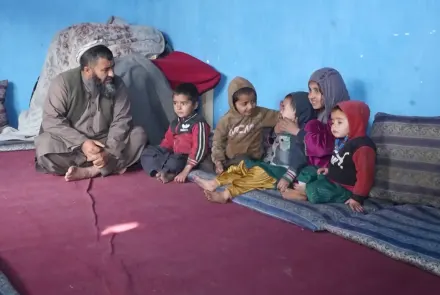A number of internally displaced people in the capital told TOLOnews that the Islamic Emirate has given them a deadline of Hoot 1402 (March 19), to return to their original provinces.
These displaced people emphasized that they are facing economic problems and do not have the financial ability to return to their original provinces.
Hodkhil, who came to Kabul from Laghman due to the civil wars of the last few decades, told TOLOnews: “We don’t have firewood, food, or oil at home. There is nothing, life is very difficult. Now the government wants us to move. I don’t have any land in my original province either.”
Shukria, another displaced person, told TOLOnews: “No one helped us. It’s winter and we have lots of problems including paying for water and bread. With all these challenges they still asked us to move.”
Zistan, another displaced person, said: “If we go to Iran or Pakistan, they will deport us. This is our own land, instead of this, it’s good for them to burn us, where should we go?”
The deputy minister of Refugees and Repatriation (MoRR), Abdul Rahman Rashid, said that Kabul Municipality covers the living areas of internally displaced people for the purpose of reconstruction of the city, therefore, these displaced people have been asked to move to their original provinces.
Abdul Rahman Rashid, said: “The Ministry of Urban Development and Land has started the work and reconstruction. These people have returned voluntarily, we have settlements for them in the provinces.”
Earlier, the Ministry of Refugees and Repatriations gave statistics that there are three million internally displaced people in the country, one million of which have been transferred to their regions.
United Nations High Commissioner for Refugees has expressed concern about the situation of internally displaced people in Afghanistan.
In a report, the UNHCR said that there are currently over three million IDPs inside Afghanistan who are in need of assistance.
Ibrahim is one of the IDPs who was displaced from Parwan province to Kabul ten years ago. He says that coping with the cold winter is a big challenge for his family.
“You see my children; I dropped them from school. How good it would have been for their future if they could go to school. I make them wander around the city and collect thrown-away materials/metal,” said Ibrahim, an IDP in Kabul.
“We do not have a place to live, we ask for a land, home,” said Bibi Hawa, the spouse of Ibrahim.
“Conflict is no longer the primary driver of displacement in Afghanistan, but 3.25 million Afghans remain displaced within the country and over 5.53 million are registered refugees or Afghans in refugee-like situations in the region,” reads the UNHCR report.
The IDPs urge the Islamic Emirate to provide them working opportunities and shelter.
“We are living in limbo and dealing with various challenges,” said Saleh Muhammad, an IDP from Nangarhar province.
“We want shelter for our families, education facilities for our children and working opportunities for ourselves. Children have no future here,” said Malek Gul Khan, an IDP from Laghman province.
Although the Ministry of Refugees and Repatriation has not given numbers, the UNDP in a report said that with 6.55 million IDPs, Afghanistan is the world’s second-largest country after Syria that is home to a large number of internally displaced people.
A number of displaced families in Parwan province said they are passing through a hard time in the cold winter as they lack the required facilities for their daily lives.
The families asked the government to help them to return to their homes.
Gul bibi, Laila, and Sohaila are sisters who were displaced due to conflicts last year. They said they collect waste from around the city and use it for warming their homes.
“We collect plastics and waste and use them for warming our homes,” said Sohaila, member of a displaced family.
Other internally displaced persons criticized the aid distribution process in the province and asked the government to help them to return to their home provinces.
“We ask the government to facilitate our return to our homes, resume our schools and pay attention to our children’s education,” said Aziz Agha, member of a displaced family.
“We received some aid but that is not enough for us,” said Noor Agha, a displaced person.
Local officials in Parwan said that efforts are underway to address the problems faced by displaced families.
“Efforts are underway to address their problems regarding home, health and water. We will solve all of them soon,” said Mohammad Idris Anwari, the governor of Parwan.
Figures by the Refugee and Repatriation Department in Parwan show that at least 5,000 families have been displaced in Panjshir, Laghman, and Kapisa and have moved to Parwan over the past year.—Tolonews










